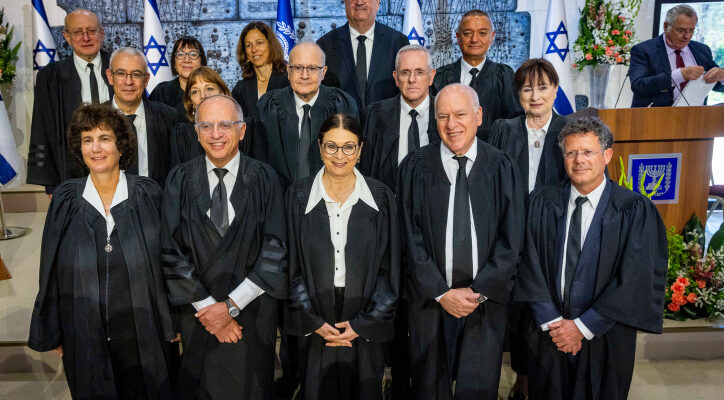Opposition says 9 or 10 justices should be able to overrule Knesset law, while coalition’s bill says a majority of 12 is necessary.
By Batya Jerenberg, World Israel News
Negotiations between the Opposition and Coalition on one of the biggest issues in the judicial reform package – judicial override – hit an snag this week, Kan Reshet Bet reported Thursday.
The government’s current bill on the subject of how many justices are needed to overturn a regular Knesset law, which has already passed its first reading, says that 12 of the 15 sitting Supreme Court judges must agree in order to cancel the law – down from 15 in the original draft of the bill. Yesh Atid is demanding that the number be reduced to nine – just one more than a bare majority, while the National Unity party is willing to compromise at ten.
According to the report, the parties signaled in closed talks that they believe an agreement can be reached on the issue.
The court cannot strike down Basic Laws according to the current bill, and the report did not mention negotiations on this issue.
The two largest Opposition parties have also presented different views of the enactment of Basic Laws, with Yesh Atid again taking a hardline. While the bill already on the table would allow an absolute majority of 61 MKs to pass or amend Basic Laws, Yair Lapid’s party says a supermajority of 80 legislators should be necessary for each of the four readings (vs. three for a regular law).
National Unity’s Benny Gantz is much closer to the government’s position, arguing that a special majority is only necessary for the final reading, and putting that number at 70.
The thorniest issue, the question of how to select new judges, has been put aside for the moment, according to the report.
The current compromise on the table, according to the news channel’s report earlier this week, is that lawmakers and Supreme Court justices could choose from senior attorneys, retired judges, academics, and legal scholars and researchers, then appoint them to the selection committee for a set number of years.
This would theoretically reduce politicization of the selection process, as the members would not be removable and so would not face pressure to please their patrons by voting for or against a specific nominee.





